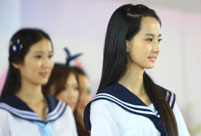 Top 10 pricey destinations for studying abroad
Top 10 pricey destinations for studying abroad
 Couple chase tornados to create perfect storm photos
Couple chase tornados to create perfect storm photos
 Goddesses at Golden Eagle Festival
Goddesses at Golden Eagle Festival
 J-10 fighters show aerobatic stunts in smog-free sky
J-10 fighters show aerobatic stunts in smog-free sky
 Top 10 charming female soldiers of the PLA
Top 10 charming female soldiers of the PLA
 Charming contestants of Shanghai Int’l Model Contest
Charming contestants of Shanghai Int’l Model Contest
 Most amazing chi-pao beauties
Most amazing chi-pao beauties
 Beauties forever
Beauties forever
 Picturesque autumn scenery of Hongshan Army Horse Ranch
Picturesque autumn scenery of Hongshan Army Horse Ranch
 Lingerie show at 2014 Miss China
Lingerie show at 2014 Miss China
BEIJING, Oct. 16 (Xinhua) -- President Xi Jinping's speech about the importance of arts is not the first time a leader has drawn attention to the significance of the topic.
The development of literature and arts has always been important for the Communist Party of China (CPC), whether battling to found a New China or ruling a fast rising country.
In 1942, in Yan'an, in the country's remote northwestern corner and a CPC revolutionary base for years, Mao Zedong spoke at a meeting of artists on how socialist literature and arts could contribute to the cause of communism and liberation of Chinese people.
Mao defined the working class and farmers as the major audience and object of art works, instead of intellectuals. Encouraged by the speech, dozens of writers and artists whose works are still popular today appeared.
About 72 years later, Xi Jinping, general secretary of the CPC Central Committee, addressed another forum on literature and arts, again calling for artworks to "embody socialist core values in a lively and vivid way", to "uphold Chinese spirit" and "rally Chinese strength".
Xi wanted the artists to be aware of their responsibility to the country and the people, like the older generations in revolutionary times.
Xi told artists that the people should be the major audience of their works and the source of their creation, warning against art works "becoming the slave of the market and bearing the stench of money."
His remarks did not come out of the blue. Compared with the notable increase of economy and state power, China's literature and art works are less impressive.
Although China has already had a Nobel Prize winner in Literature and a number of Chinese films have won international awards, there are plenty of vulgar, repetitive and fast-food art works. They lack insight and artistic values and do not meet the needs of the people.
Producing a huge amount of TV shows, movies and publications, the country's strength in culture has yet to be fully released. This weakness goes against China's ambition in realizing the national revival and sharpening its global image.
The Republic of Korea, a neighboring country of smaller land and population, has seen several TV series, such as "Winter Sonata", delivering a new image of the country to global audiences. Not a single Chinese pop song has gained as much international popularity as "Gangnam Style" did.
Art comes from life but goes beyond life. The current weakness of Chinese literature and art may derive from the pervasion of consumerism and money worship. These trends prevent artists from reaching deep into society to find the most vivid materials -- the method that Xi called for in the meeting.
A more favorable environment for artistic creation is also needed. The CPC acknowledges the principle of diversity, putting it as "All flowers bloom together, and let all schools of thought contend for attention."
The phrases were used by Mao in the 1950s to describe the flourishing of culture and they should be truly realized now.
Xi promised to promote "the democracy in academic and artistic circles" and create a "constructive and easy environment". He also urged the Party departments to respect the creativity of artists, grant them full trust and support.
Economic power alone cannot make a country respected. As the nation is now seeking a rejuvenation of its ancient greatness, it is time for Chinese culture, including literature and arts, to catch up.
 Shocking! Photos of Chinese fighters revealed
Shocking! Photos of Chinese fighters revealed Blue Angels thrill spectators in San Francisco
Blue Angels thrill spectators in San Francisco World's most intimidating nuclear weapons
World's most intimidating nuclear weapons Standard faces for each countries
Standard faces for each countries Who is China's campus beauty queen?
Who is China's campus beauty queen? Netizens fall in love with champion swimmer Ning Zetao
Netizens fall in love with champion swimmer Ning Zetao Vibrant 21-year-old and her own Cheongsam brand
Vibrant 21-year-old and her own Cheongsam brand Fashion style: Faye Wong vs Cecilia Cheung
Fashion style: Faye Wong vs Cecilia Cheung Leading director Wang Quan'an detained for 'buying sex'
Leading director Wang Quan'an detained for 'buying sex' Top 10 handsome football players
Top 10 handsome football players  Top 10 Chinese goddesses
Top 10 Chinese goddesses  Top 20 hottest women in the world in 2014
Top 20 hottest women in the world in 2014 Top 10 fifth generation jet fighters in the world
Top 10 fifth generation jet fighters in the world Top 10 pure beauties in showbiz
Top 10 pure beauties in showbiz  Top 10 world's highest-paid models 2014
Top 10 world's highest-paid models 2014 The most gorgeous Chinese women
The most gorgeous Chinese women Top 10 most handsome faces in Asia
Top 10 most handsome faces in AsiaDay|Week|Month